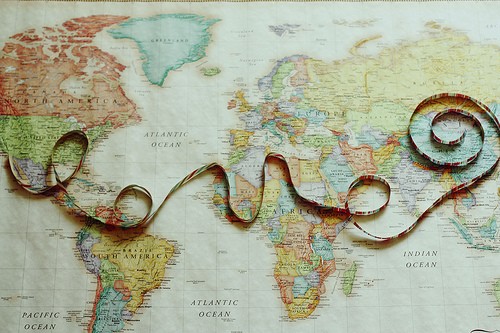Despite the short days and cold weather—or maybe because of them—February has become the month for coupling, perfectly etched into the global holiday that is Valentine’s Day. Unfortunately, with love comes heartache, a feeling that can be greatly exacerbated when every grocery store and pharmacy is decked out in heart-shaped trim and the one you love is an ocean away. To honour all loves near and far, the McGill Tribune has compiled some of the best songs from across the world. Scroll down to listen to Trib Mix: LDR and learn more about three of the songs that made the list.
“Crystal” – Kaaris (France)
It’s not terribly surprising that America dominates hip hop. The US birthed and nursed the genre that has since failed to find its wings. International rap almost never gains notoriety outside of its home country, which is disappointing given the immense talent that exists beyond North American boundaries. Rap remains one of America’s largest cultural exports, however, undoubtedly influencing the international artists who repurpose US tropes to their domestic audience.
This one way exchange is perhaps most evident on French rapper Kaaris’ track “Crystal,” where well-known US rapper Future lends his drawling voice to the track’s hook and one verse, while Kaaris compares himself to young American rapper Bobby Shmurda ("J'rentre dans le carré comme Bobby Shmurda"). The comparison to Shmurda, a young figure in rap with an uncertain career, is surprising for how current it is. Kaaris has his ear towards US rap and he is taking notes.
Kaaris glides over trap beats with french slang so coded that even fluent speakers need to take pause. But understand it or not, the words are backed by hard hitting production from producing duo Therapy, that underscores every violent lyric. In “Crystal," Kaaris uses his fast, choppy flow that is indicative of his style while simultaneously mimicking US trends.
Despite the presence of Future on “Crystal," Kaaris has not been awarded any notoriety outside France. Perhaps this is just the place of international rappers. Kaaris acts as a domestic gatekeeper to the broader rap scene, taking US tropes and co-opting them to make them feel authentic to a French audience. Even if this is the case, Kaaris’ music cannot be pushed aside as a cheap imitation. “Crystal” provides a mere glimpse into the expansive and truly excellent discography of Kaaris.
— Noah Sutton
“Comme des Enfants” – Coeur de Pirate (Quebec)
Following the release of her first album eight years ago, Coeur de pirate, Beatrice Martin—better known as Coeur de Pirate—has risen to stardom and made Québec’s francophone music bloom in popularity. Originally from Outremont in the heart of Montreal, Coeur de Pirate’s musical style diverges from more traditional Québécois styles. While many francophones were used to folk music and nationalistic songs about the province, Coeur de Pirate dissociated from the norm by producing stripped-back pop music.
Singing entirely in French, her vocals are primarily accompanied by piano, and at certain occasions, strings, tambourines, or guitar to influence the melody as well. Since 2008, she has then released two others albums, Blonde, in 2011 and more recently, Roses last year.
While her eponymous first album travels through the woes and complexity of love and relationship. While the lyrics resonates the melancholy of past relationships, the stripped back melodies contrast them and lighten the songs. “Comme des Enfants”, second track of the album, begins with the simplicity that Coeur de Pirate is all about. Starting with a piano melody, the story begins gently with simple vocals. As the tune embarks into the chorus, strings come in support to the piano melody. It doesn’t really matter if you can understand the lyrics or not, this francophone track is sure to make any day brighter.
— Laurie-Anne Benoit
“Fukai Mori” – Do As Infinity (Japan)
“Fukai Mori” is one of the first Japanese songs I remember ever listening to. Out of my repertoire of East Asian songs, soundtracks, and instrumentals, “Fukai Mori,” remains the most memorable. Contemplative and down-to earth, this song sings in melodies of yearning and desire—imploring hope, compassion, and purpose in a life of endless wandering.
Known in English as ‘Deep Forest,’ “Fukai Mori” was famously used as the second ending theme in the hit fantasy anime Inuyasha, which entered Canada via YTV in 2003. In terms of origin, however, the song was released by the band Do As Infinity in 2001; till this day, it remains one of the group’s best-selling singles.
There is a certain uniqueness to “Fukai Mori” that is often amiss in other foreign-language tracks. Simply put, the meaning of this song is not confined to language. Listening to Deep Forest, every aspect of the melody comes together to paint a story. The strum of guitar, like footsteps, gentle but firm; a voice, pressing—searching for what was once familiar. This is a tale of a heart that has lost but still dreams. Persuasive and relatable, the colours of this song dye the scenes through listening and feeling. To any audience, its essence is easily intuited without the meaning of words. This, truly, is fantasy reified.
— Adrien Hu









